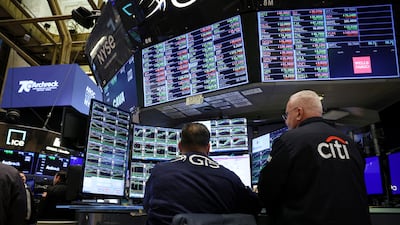A rally by the world’s largest technology companies helped US stocks register their best week so far this year.
With the latest inflation data coming roughly in line with estimates, this also lent support to Wall Street.
The S&P 500 and Nasdaq registered their biggest weekly percentage gains since early November 2023.
The S&P 500 gained 1.02 per cent to close around 5,100 on Friday, while the tech-heavy Nasdaq 100 climbed almost 2 per cent. The Dow Jones Industrial Average rose 0.4 per cent.
MSCI's gauge of stocks around the globe rose 0.9 per cent to 762.39 on tech sector optimism, following good results from Alphabet and Microsoft.
The yield on 10-year US Treasuries declined four basis points to 4.67 per cent.
Google’s parent company Alphabet on Thursday announced it would issue its first dividend, at 20 cents a share, and authorised a stock repurchase programme worth $70 billion.
The world's largest provider of search and video advertisements reported a 15 per cent increase in its revenue for January to March, to more than $80.5 billion, passing analysts’ estimate of $78.5 billion.
Microsoft reported stronger profit and revenue than expected, driven by an artificial intelligence push and increased adoption of cloud solutions globally.
The company’s net income jumped 20 per cent on a yearly basis to $21.9 billion. Revenue during the January-March period surged 17 per cent to $61.9 billion, passing analysts’ estimate of $60.8 billion.
They helped offset a 9.2 per cent drop for Intel. It reported stronger profit for the latest quarter than expected, but its revenue fell short of analysts’ estimates.
“Microsoft and Google’s Alphabet both jumped in the after-hours trading after announcing sufficiently strong results that met and surpassed expectations,” Ipek Ozkardeskya, senior analyst at Swissquote Bank, said.
“Microsoft gained more than 4 per cent on better-than-expected sales and profit, thanks to robust corporate demand for its cloud and AI offerings, while Google jumped 11 per cent, boosted by its own cloud business.”
The latest results from large technology companies have reinforced Big Tech’s foothold, helping offset worries about the macroeconomic backdrop, Bloomberg reported quoting Solita Marcelli at UBS Global Wealth Management.
“With tech fundamentals staying robust, in particular from Big Tech in the first quarter, we continue to highlight the recent correction has provided interesting entry points for tech and AI-related stocks,” Ms Marcelli said.
US data also boosted sentiment, with the personal consumption expenditures (PCE) price index up 0.3 per cent in March, in line with estimates by economists.
In the 12 months through March, PCE inflation advanced 2.7 per cent against expectations of 2.6 per cent.
Stocks have broadly been under pressure this month after hopes faded for multiple interest rate cuts this year by the US Federal Reserve.
Reports that show inflation remaining higher than forecast have driven traders to expect only a single cut this year, down from forecasts for six or more at the start of 2024.
The inflation readings will likely keep the Fed on hold at its next policy meeting on Wednesday.
Its main interest rate has been sitting at the highest level since 2001, as officials aim to undercut inflation by putting downward pressure on the economy and financial markets.
“Inflation, which slowed last year thanks to fading post-pandemic boost, is now fuelled by still-robust demand. And that’s something the Fed could address by keeping its policy tight,” Ms Ozkardeskya said.
“Swap traders now price in 35 basis points cut for the entire 2024, down from six rate cuts priced in at the start of the year.”
If interest rates stay high, companies will need to produce stronger profits for their stock prices to rise.
About three in four companies have been exceeding analysts' forecasts for profit, according to FactSet.


